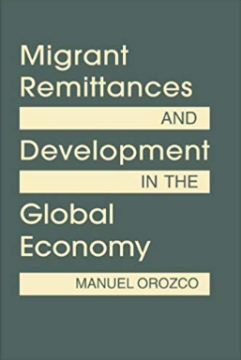Will the New US Aid Plan for Central America Be Successful?
Will Central American governments spend the money effectively? Do the countries in the isthmus have a good plan to fight the drug cartels?
On March 16, 2022, the Inter-American Dialogue hosted a conversation with Assistant Secretary Brian A. Nichols to discuss the Biden-Harris Administration’s efforts to tackle the root causes of migration from Central America to the United States. Michael Shifter, president of the Inter-American Dialogue, introduced the conversation, which was moderated by Manuel Orozco, director of the Migration, Remittances, and Development program at the Dialogue.
Nichols kicked off the conversation with opening remarks outlining the goals and progress of the Biden-Harris Administration's work in the Western Hemisphere, with a specific focus on the Northern Triangle countries (Guatemala, Honduras, and El Salvador). He stressed that it is in the United States’ national interest to promote a democratic, prosperous, and secure Central America. The current administration plans to accomplish this goal by addressing the root causes of migration in Central America, such as economic insecurity, corruption, and political turmoil. The Root Causes Strategy seeks to effectively eliminate drivers of irregular migration and foster conditions for economic growth in the Northern Triangle so that citizens benefit from staying in their home countries. Some early accomplishments of the Root Causes Strategy shared by Nichols include combatting Covid-19 in the region by providing vaccines and monetary support, working with private sector leaders to create economic opportunities, publicly designating corrupt actors to increase transparency, fighting against human trafficking and migrant smuggling, preventing violence during the 2021 presidential elections in Honduras, and a joint job creation program with Mexico called “Sembrando Oportunidades.”
Orozco facilitated the conversation by asking wide-ranging questions about Central American migration to the United States and the impact of the Root Causes Strategy. He prefaced the conversation by pointing out that migration from the Northern Triangle and the rest of Latin America and the Caribbean will continue to grow in 2022, and is expected to reach similarly high numbers as in 2021. This sustained high migration is strongly correlated with economic issues, individual aspirations, and political realities.
On the topic of the Root Causes Strategy, Orozco asked about the involvement of Central American governments. Orozco also brought up the Migrant Protection Protocols, the Engel list of corrupt actors, the role of the private sector, and the importance of including climate-driven migration in the Biden Administration’s policy agenda.
Nichols emphasized the magnitude of the stakes that Central American governments have in the Root Causes Strategy. He explained that the strategy also involves civil society and international organizations across the region, which has helped to create a collaborative migration management system with the Northern Triangle countries. Nichols strongly emphasized that the Migrant Protection Protocols (MPP) are not a part of the Root Causes Strategy, and that the Root Causes team has spoken out against the endemic flaws in these protocols. While the administration is currently in the midst of an appeals process to terminate MPP, for the time being, actors must work from within the program in order to reduce its flaws.
Regarding the individuals that are placed on the Engel list, a designation of corrupt actors for the Northern Triangle countries, Nichols highlighted the strength and effectiveness of the sanctions that are levied against individuals on the list. The lengths that individuals go to in order to avoid these sanctions are indicative of the real consequences of being on the Engel list, he explained.
On the topic of the private sector, Nichols explained that Vice President Harris has met with private sector leaders and has secured a US$1.2 billion commitment to job creation in the region. Simultaneously, the Root Causes Strategy recognizes that climate change is a significant driver of migration on a global scale and is looking into different initiatives to tackle this pressing issue, including with the private sector.
Towards the end of the conversation, Shifter expressed his surprise at the fact that the Northern Triangle countries were not invited to the Summit for Democracy that was held in December, 2021. He inquired about the presence of these countries at the upcoming Summit of the Americas, and how the administration plans to specifically engage them. In response, Nichols explained that the list of countries at the Summit for Democracy was not exhaustive, and that the Summit of the Americas will be more inclusive. Nichols underscored the need to have frank and productive discussions leading up to this Summit, focusing on policies that will promote welfare for people throughout the region, including such key topics as rule of law, corruption, and separation of power.
Will Central American governments spend the money effectively? Do the countries in the isthmus have a good plan to fight the drug cartels?
As the global financial crisis continues to alter US relations with the hemisphere, greater engagement in the region remains critical to US interests.
How do patterns of migration and remittances differ across regions? What kinds of frameworks support the contributions of remittances to local development?

